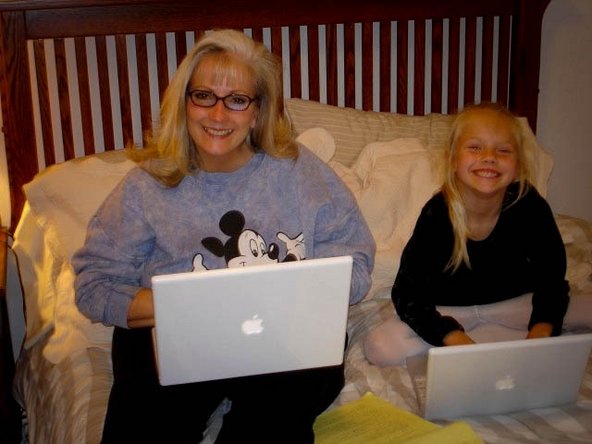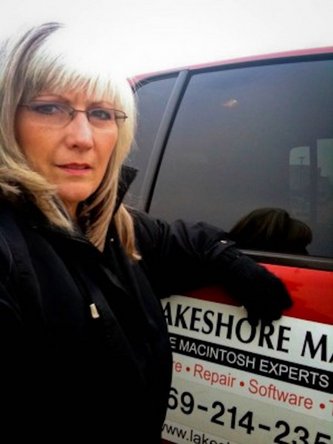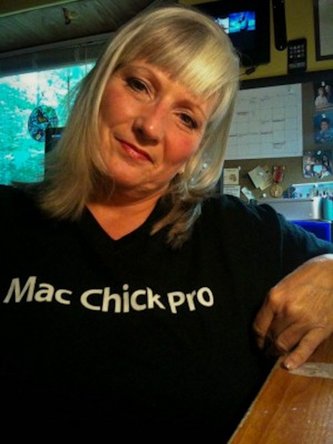Jodi Spangler has worked a lot of interesting jobs. She climbed telephone poles for a while in Michigan (until she fell off a pole from twelve feet in the air). She also drove a school bus in Southern California’s Fullerton School District for three years. Most people don’t get into computer repair by driving a school bus, but Jodi Spangler is definitely not most people.
From School Bus to Mac Tech
In 1983, she was offered and accepted a job driving a school mail truck in the morning and receiving textbooks in the library in the afternoon. The library had recently purchased a bunch of new Apple II computers, and the man Jodi replaced became the library’s computer repair tech. When the library was slow, he would show her a little bit about the computers and explain some of the fixes he was doing. Jodi was paying attention. One week, he left to go on vacation. While he was gone, Jodi dug into the computers—one had a broken floppy drive. She made a speed adjustment that “re-calibrated the read head so it could read the floppy disk again.” It worked, so she kept going. By the time the repair tech returned from his vacation, she’d fixed ten computers.
Jodi ended up marrying that repair tech. And she also ended up taking his job, when he left to go into law enforcement two years later. She went on to take some electronics classes so she could learn about circuits, resistors, how to tell why a power supply isn’t working, and so on. That was the beginning of a lifetime of Mac repair for Jodi. “My husband tells me all the time that he created a monster,” she laughs.
Founding Lakeshore Mac
Today, Jodi runs her own Mac repair company, Lakeshore Mac. She goes to people’s homes to fix their computers and teach them how to use them. Her education background has taught her that teaching and repair are inextricable. “Thatʼs what makes the difference between a good technician and a great technician,” she explains.
She has travelled all over the country with CompuMaster, teaching people how to use and fix Macs everywhere from Boston to Las Vegas to Alaska. Jodi sees everything as a learning experience—in Boston, she read all about the history of the Boston area and Paul Revere. In Alaska, she worked in the “bush” with an Inuit tribe (“that’s where I learned that the word ‘Eskimo’ is a racial slur,” she adds, “I didn’t know that in those days”), including people who had to travel hundreds of miles by plane and dirt roads, just to come to her class. And yet, she’s humble: “I learned as much from the people that I taught as they learned from me.”
Why Aren’t More Women in Computers?
The human element of computer repair is really what appeals to Jodi. She likes being able to share computer knowledge with people, teach them how to do what they want with their equipment, and show them how to fix their stuff themselves. Lots of women, Jodi says, think that computer science means having to distance yourself from people. Perhaps that’s why only 13.8% of 2010 computer science Bachelor’s degree recipients were women, a number that has been dropping pretty much every year since computer science degrees have been offered.
She explains, “Itʼs because even the word Computer Science sounds so boring, complicated, and claustrophobic! Men can stay shut up in a server closet forever and be perfectly happy. Put a woman in there, and sheʼll go crazy!” She argues that women tend to be more attracted to interactive, nurturing roles. Working in computers can be very human, she’s careful to emphasize, especially in repair: “Thatʼs why when you get your computer fixed by a man, heʼll fix it and then just give it back. A woman will fix it, give it back and tell you how she did it.”
Jodi has found that she has to prove herself in situations where a man might command respect immediately—she’s learned to win people over with humor and confidence. She’ll never say she can’t fix something, even if it’s something she hasn’t fixed before.
So how can educators encourage more girls to enter computer jobs? Most importantly, they need to make it clear to girls that jobs are available in computer science that will appeal to them—studying computers is not just about being “shut up in a server closet forever.” Parents, too, can help their girls be as handy as the boys by not distinguishing between girls’ work and boys’ work. Jodi’s dad was an architect, a builder, and, during WWII, a pilot. He was always working on his plane, car, or boat. His four daughters would often hang around as he worked, and he’d enlist their help. When he’d say, “Give me a wrench, 3/16ths,” the girls had to know what that meant. For the ‘60s, Jodi says, “he was pretty revolutionary.”
His attitude was repaid in kind: with computer repair work, Jodi was able to support her dad after her mom died of cancer. And Jodi now shares her love for technology with her ten grandkids, who have come to associate gadgets and repair with grandma’s house.
One day a couple of years ago, Jodi and her husband were doing some home improvement work when she realized it was time to go pick up two of her grandkids. When Jodi came back in with the boys, her husband was working on putting together a shelf. Six-year-old Gabriel, astonished to see a screwdriver in his grandfather’s hand, exclaimed, “Grandpa! What are you doing?! Don’t you know that Grandma’s the fix-it girl?”








One Comment
Thank u Jodi for your kindness your wisdom and the knowledge u have gathered & are happy to share with anyone willing to listen. I am so grateful I found your channel I read it first for any new information of what is happening in our country God Bless & Merry Christmas ?
Susan - Reply